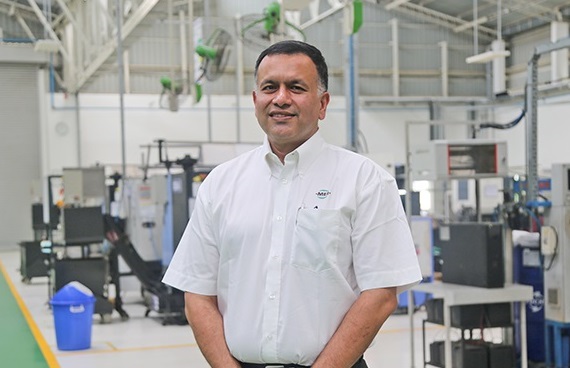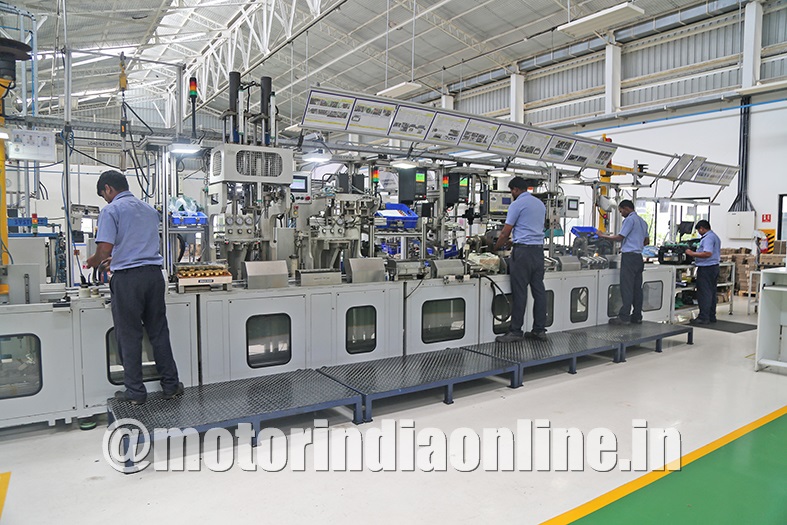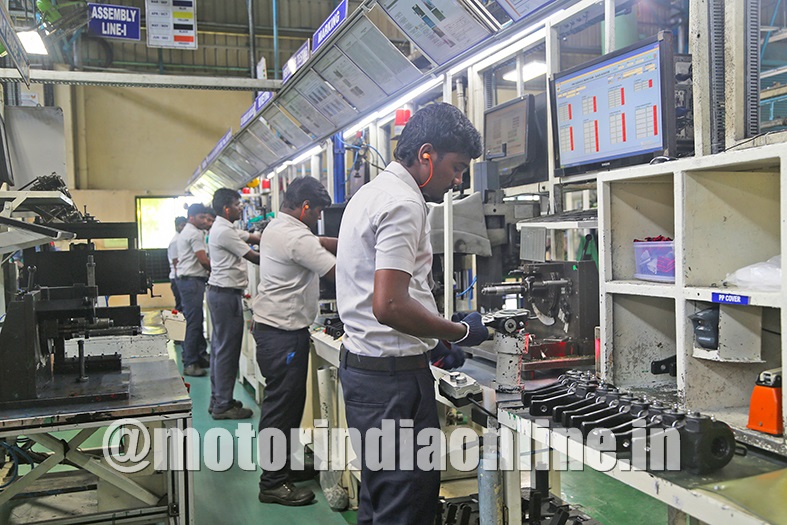Madras Engineering Industries Ltd. (MEI) has been manufacturing a variety of components for the domestic and the global automotive industry for more than five decades. It began turning out manual slack adjusters for air brake systems for light, medium and heavy commercial vehicles in 1982, a move that has enabled it to emerge as the world’s second largest slack adjuster manufacturer.

Mr. Sriram Sivaram, Director, MEI, who now heads the professionally-run family-owned firm, speaks about the company’s business plans, rising global aspirations, upcoming products, and lots more.
Excerpts:
Please give us an update on the current market scenario. How is the mood in the industry and how is business at MEI?
Our business is quite dependent on the Indian medium and heavy commercial vehicle market. In my honest opinion, no one currently knows what’s happening in this market. The year 2018-19 was a very mixed one for our industry.
Starting from October 2017 the growth was very aggressive, with the component industry not being able to keep up with the demand of the OEMs. But by June 2018, when the new axle load norm was announced, there were many ups and downs and a lot of uncertainty which still continues.
Ignoring the short term volatility, we have seen a good five years of growth in the industry. Historically, this industry segment has seen a downturn after every growth phase of four to five years. The question this time is when will we see the downturn. The upcoming scrappage norms and the BS-VI transition are significant regulatory issues which can cause the market to behave differently. As for our business in the global market, we have done quite well.
What kind of production capacities do you have at present? Where are your investments directed towards?
The auto component industry in India has usually been hesitant to invest in capacities ahead of the market demand, while the OEMs have generally invested ahead of us. MEI has traditionally invested ahead of the market; we have a track record of being at least six to 12 months ahead of others in the industry.
Over the last 12 years, MEI has grown 10x in size. In order to achieve that growth, we have had to invest heavily. We try to follow a policy of earning and then spending, which has made most of our investments internally generated.
Over the last seven years, we have invested close to Rs. 200 crores in adding capacity and we continue to invest aggressively in R&D and new product development. We currently have three state-of-the-art manufacturing facilities in Chennai – at Ambattur, Maraimalai Nagar and Mahindra World City – apart from our own iron foundry at Pillaipakkam.
About eight years ago, we had realised that the most significant input material for our business is iron castings; we faced difficulties in securing consistent supply of high quality castings and so we invested in a captive foundry to ensure that our growth was not limited by this supply constraint. That was one of our biggest investments till date and it has enabled us to respond very quickly to customer demands.
Having entered the iron foundry business, we have found that there are many other customers who had faced the same difficulty as MEI in sourcing castings, and hence had commenced developing castings for many external customers. We have since grown as a high quality castings supplier. Most recently, we have doubled our foundry capacities; we now have a capacity of 25,000 metric tons, annually. Our goal is to grow this business as an independent vertical and use less than 25% of its capacities for our captive requirements. We export ready-to-fit machined castings to the US and European markets, and that has called for investment in casting machining facilities.
We are increasing our automatic slack adjuster capacity by almost 60 per cent this year, and when those capacities are ready, hopefully by June 2019, we will have a capacity of over four million automatic slack adjusters annually. The overall requirement for automatic slack adjusters in the Indian market is estimated to be around three million per year; so we are ready to cater to the entire market.
We have also invested in our air disc brake development and production facilities.
How has your air disc brake been received in the market?
When drum brakes are replaced by disc brakes, slack adjusters are no longer needed. When the global market started moving in this direction, we started working on an in-house technology development program. In terms of adoption, Western Europe has led this, and currently around 75% of commercial vehicles produced use air disc brakes. It is expected that by 2022, over 50% of the North American market will switch over to air disc brakes while the rest of the world has been slow in adopting it due to the higher cost. Around eight years ago, we kicked off a new product development program to indigenously develop air disc brakes which we could export to the European market. This program has been successful, and we first launched our product at the 2016 edition of the IAA Commercial Vehicles show in Germany.
The product has received positive reviews and is currently being supplied to the European aftermarket. We are also in discussion with a few OEMs, and it is quite gratifying to see requests coming in from a number of them for us to be an alternative supplier to our much larger global competitors.
What made you enter the clutch booster space? How has the product fared in the market?
For a very long time MEI was called the ‘slack adjuster company’ as we were very focused on slack adjusters. We wanted to break this perception and challenge ourselves by developing a completely new product from scratch.
Around the beginning of this decade, there were no locally manufactured clutch boosters in India. The European ones were really expensive and cheaper Chinese options were not good enough. Upon the request of a leading OEM, we accepted the challenge of developing a clutch booster suitable for the Indian market.
We used all our engineering capability, invested a lot and came up with a winning product. In fact, while developing the product, our team had a catchy slogan to develop a new product that could ‘Match German technology, manufacturable with Japanese quality, at Chinese prices, but by using Indian engineering!’
With that first product, we bagged 100 per cent share of business from the OEM and continue to be a single source. While we learnt a lot from that experience, we also proved to ourselves and our customers that MEI is not just a slack adjuster company and that we have immense engineering and product development capability. We have since expanded our product portfolio of clutch boosters and are a significant supplier in the Indian market.
How strong is MEI’s presence in the global arena at present?
We play a significantly dominant role within our narrow niche of products within the Indian market. Two decades ago, India was a relatively small market for medium and heavy commercial vehicles. But as India’s GDP has grown at a healthy rate since liberalization and is expected to continue to grow, the Indian CV industry is poised to become the second largest in the world by 2030. Further, India, in the current geo-political environment, is in a strong position to play in the global arena. This change in India’s status on the global arena has allowed MEI to also become relevant in the global market place. We are accepted by many OE customers and aftermarket distribution partners in leading commercial vehicle markets like North America, Europe, Brazil, Russia, Korea and Japan. The only market where we have not actively promoted our products till date is China.
Indian auto component suppliers who have invested and developed certain core strengths can be very competitive, meet global quality standards and really grow their business globally. That is what we at MEI are trying to do. Our goal for the next five years is to become globally dominant. We currently support our global customers from India and through our wholly-owned subsidiary in the UK. We operate with dedicated business partners and sales agents in various locations around the world. We anticipate the need to expand our global footprint over the next few years to provide greater customer support as we grow our global business.
We are currently the second largest in the world in our main product line (slack adjusters) and are focusing our energy on getting closer to becoming the first. The CEO of our largest global competitor recently announced a project named “Go India” under which he anticipates more parts of their single largest product line – brake adjusters – to be manufactured in India to lower their costs. MEI views this as one of the best compliments that the Indian auto component industry could have received, and we are happy to have played a role in this recognition.
On the aftermarket side, how is business in India?
Until 2007, we did not have much of an aftermarket presence in India. When the regulations changed in India from manual to automatic brake adjustment, we felt there was a need to educate the drivers and mechanics on the proper use of slack adjusters. What started as a service focus drove the development of a significant After Market business. When we rolled out our product in the aftermarket, we spent a lot of time and effort to build a strong technical team that could go into the field with our channel partners to diagnose the problems and provide solutions.
Today, we are doing very well in the aftermarket space and have the widest coverage in the country with a team of more than 30 full-time employees in the field and 127 authorised service centres across the country. In a couple of years, our aftermarket business in India will be greater than Rs. 100 crores.
What was MEI’s turnover for FY19 and what are your targets for the coming years?
We finished the last financial year (FY19) with revenues in excess of Rs. 500 crores. We have been growing at around 25 per cent year-on-year and have an internal strategy to exceed Rs. 1,000 crores within the next four years by when we expect to strike a 50:50 balance between exports and domestic market sales.





